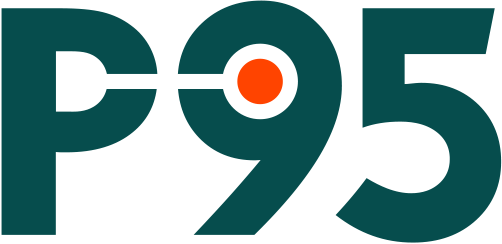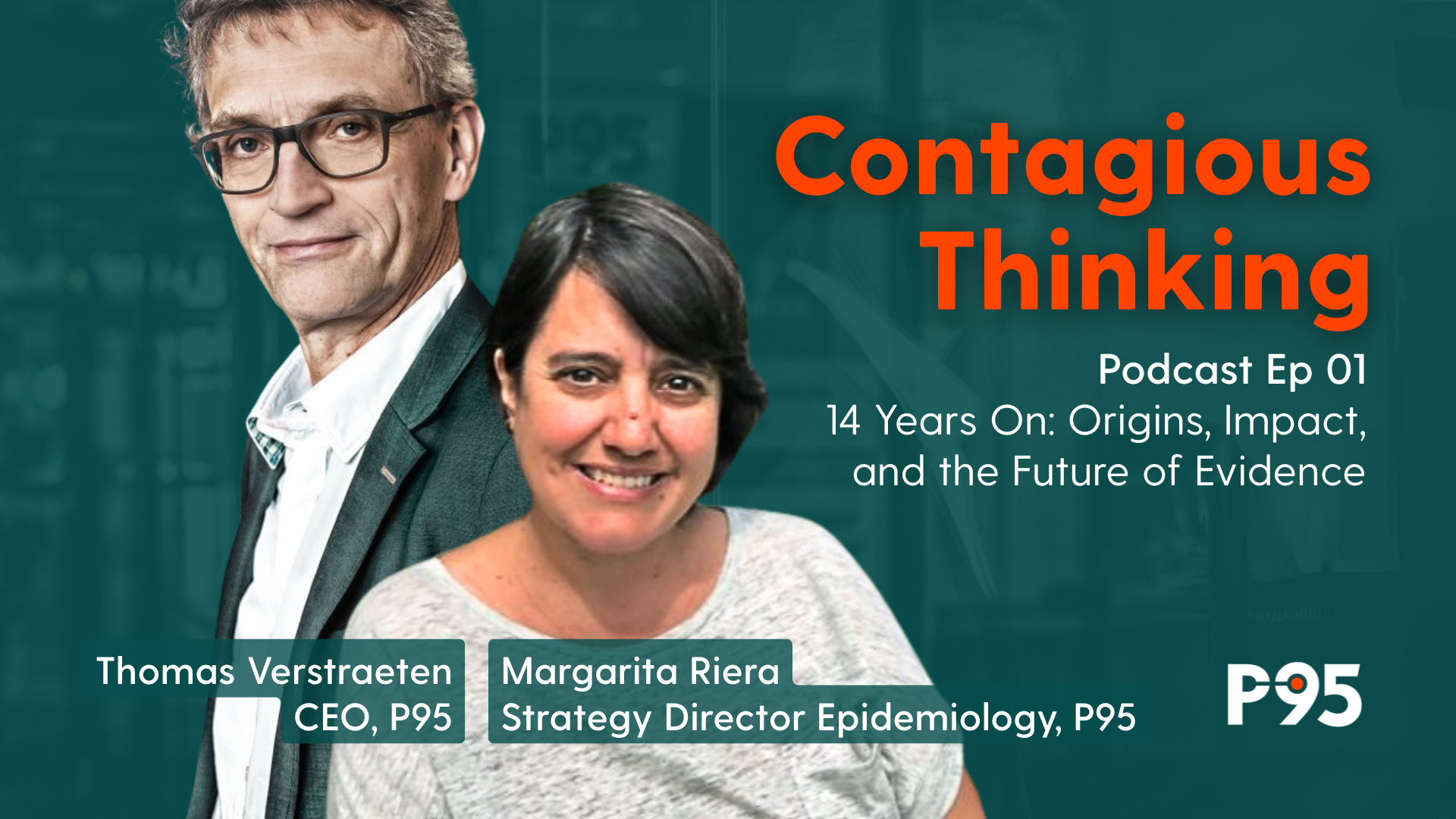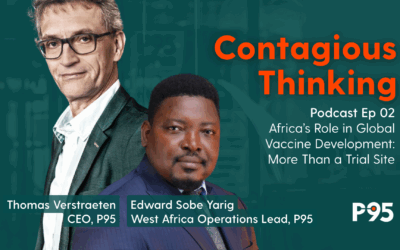What happens when a small, remote-first epidemiology company becomes one of the most trusted partners in infectious disease research? That’s the story explored in the premiere episode of Contagious Thinking, the new podcast from P95.
In this episode, CEO and founder Thomas Verstraeten sits down with Margarita Riera, Epidemiology Strategy Director and P95’s very first employee, to reflect on 14 years of growth, evolution, and lessons learned in supporting global public health efforts. From Médecins Sans Frontières to managing large public-private vaccine partnerships, Marga brings grounded insight into how P95’s work continues to shape the future of epidemiology and vaccine development.
Real stories, real science, and real decisions that shape health outcomes across the world.
Listen and Subscribe:
· Watch / Subscribe on Spotify
· Listen on Apple Podcasts
· Watch on YouTube
How P95 Became a Go-To Partner in Infectious Disease Research
For P95, infectious disease research is an important topic. Tom and Marga reveal how P95 was built to fill a specific gap: offering high-quality epidemiological support to a wide range of stakeholders. Early on, they realized both public health agencies and pharma companies needed a trusted third party to bridge the space between science, operations, and data.
“There was a gap out there for a kind of a CRO like us to support all the stakeholders in doing their non-interventional work”– Tom
Lessons from Leading Public-Private Partnerships
The team shares learnings from P95’s work on IMI programs like ADVANCE and DRIVE, and how P95 served as a data governance buffer between sectors. Their role as a neutral third party enabled open collaboration and rigorous evidence generation.
These partnerships are not only valuable, but they’re also scalable. What started in Europe is now influencing global strategy in regions like Latin America and Africa.
Why Clinical Trials Need Epidemiology From the Start
P95 didn’t follow the typical CRO trajectory. Instead of beginning with clinical trials, they began with epidemiology, and gradually built out clinical support when the science demanded it. As Marga notes, the two disciplines are now fully interwoven, especially in infectious disease.
“There is a role for epidemiology during the whole cycle of vaccine… also from the epidemiology at the very beginning of clinical development to help define target populations… moving all the way over to post-life censure, basically following all vaccine effectiveness, vaccine and registry.” – Marga
Primary Data Still Wins the Evidence Game
In a world obsessed with secondary databases, Tom and Marga both emphasize the ongoing importance of primary data collection. While linked datasets offer valuable insights, many essential variables are still missing. The best results come from blending both.
Scaling the Culture of Scientific Curiosity
As P95 has grown from 2 to nearly 300 employees, maintaining the company’s collaborative, open, and mission-driven culture has remained a core priority. Leadership and intentional hiring helped preserve that spirit.
P95 Infectious Disease Research: Episode Takeaways
This episode opens with a personal reflection on P95’s founding. Tom introduces Marga and revisits her early career, including her time with Médecins Sans Frontières. They discuss her decision to join a tiny remote-first company and how their first projects set the tone for the mission-driven work P95 would grow into.
The conversation moves through key milestones, supporting the ADVANCE and DRIVE consortia, building out epidemiology-driven clinical operations, and scaling up in regions like LATAM and Africa.
Later, Tom and Marga unpack the real challenges behind public-private collaboration and the need for agile, context-aware decision-making. They talk candidly about P95’s role as a neutral third party, the continued relevance of primary data collection, and how flexibility and cultural alignment remain critical at scale.
The episode closes with reflections on team growth, scientific integrity, and what’s next for the company’s role in global evidence generation.
FAQ
Here are some answers to Frequently Asked Questions.
What is the main insight from this episode?
The future of infectious disease research depends on strong, neutral partners who can bridge clinical, epidemiological, and operational domains.
How does this apply to vaccine developers and funders?
It reinforces the need to design studies that integrate epidemiological expertise early—and to collaborate across public-private boundaries to accelerate progress.
What makes P95 different from other CROs?
Their roots in epidemiology, their agility as a global partner, and their ability to operate as a neutral party in complex ecosystems.
Where can I learn more about P95’s work?
Visit p-95.com or follow P95 on LinkedIn for case studies, updates, and future podcast episodes.
Listen or watch now: Episode 1:14 Years On: Origins, Growth & Evidence Strategy in Infectious Disease Research
🔗 https://p-95.com/category/podcast/
Got questions or want to collaborate? Contact us




0 Comments